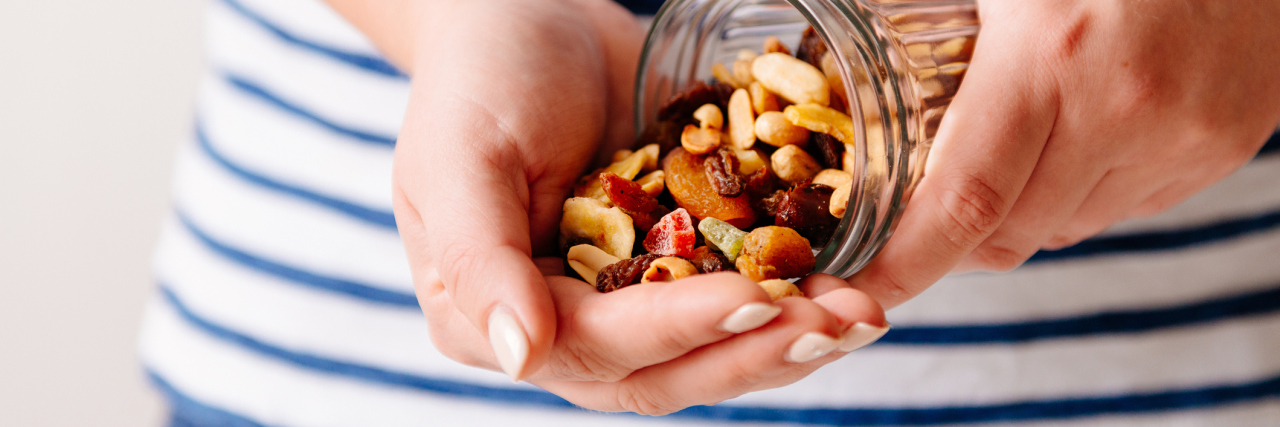5 Eating Hacks for When Depression and Anxiety Make Eating a Struggle
Editor's Note
If you live with an eating disorder, the following post could be potentially triggering. You can contact the Crisis Text Line by texting “NEDA” to 741741.
You wake up feeling like you’re covered in cement and even breathing takes a lot of effort. After snoozing the alarm five times, you get up in a fog. You swallow your meds medley, glare at your toothbrush and go into the kitchen because you’re supposed to have something to eat but find it’s too overwhelming.
Or, you wake up two hours early and start Googling all the diseases you could have or all the ways the world is falling apart. There is no cement, but a boa constrictor is slithering into your bed and squeezing the air out of you. Your mouth is a desert, the drummer for Slayer is beating on your heart and your clothes are soaked. You swallow your meds medley, glare at your toothbrush, and go into the kitchen because you’re supposed to have something to eat but you’re nauseous.
Eating can seem impossible when unwell, and that sucks. It really, really sucks. You may be nauseous, overwhelmed by the choices, or too exhausted to pour cereal and milk into a bowl. (Let alone use a spoon!) I understand the struggle so deeply and I’m right there with you. You are definitely not alone in eating challenges.
So, here are some eating hacks when struggling with depression or anxiety that I’ve learned to keep from perishing.
1. Small and simple.
If I have to use a knife and fork to cut it or find a pot to cook it, it’s too complicated. I look at eating as an all-day snack. Anything I can get into my body with any sort of nutritional value is a win. If it means nuts and milk for breakfast, cheese for a morning snack, Boost for lunch, grapes for an afternoon snack, and chicken nuggets for dinner, then I’ve been successful. If I try and get too complicated with what foods I think I should eat, then I just get overwhelmed and can’t eat anyway. Be gentle with yourself. It can be so overwhelming to prepare and eat food when all you want to do is crawl back into bed or throw up. Do what you can and then celebrate the hell out of it.
2. Protein. Protein. Protein.
Now, I’m no nutritionist or dietician but protein seems important. When we have no energy, it can give us enough fuel to take a shower or brush our teeth. I tend to gag a lot when my anxiety is at an all-time high, so I find it hard to swallow whole foods. For this reason, liquid nutrients are my go-to and I always have Boost in my fridge. If you can get your hands on a protein shake or smoothie (preferably made by someone else) that’s great. Other foods with high protein that are easy to eat are cheese, yogurt, nuts, oats, milk, broccoli, tuna, beans, hemp seeds, sun-dried tomatoes and pumpkin seeds.
3. Be prepared.
Almost all my coping skills have some version of being prepared. It’s easier to come up with solutions when your brain isn’t fuzzy and tummy cranky. For me, it’s all about having food that’s easy to find, make and eat. Microwave meals are a good example. They aren’t cordon bleu prepared but it’s better than stale crackers under the couch. You can also fill your freezer with leftovers, get pre-cut fruits and veggies, and stock up on protein bars, cereals, mixed nuts, crackers and cheese, yogurt, and have pizza on speed dial. It also helps me to have some favorite foods in the cupboard because I’m more willing to eat them. On really bad days if all I can eat is Cheetos and chocolate then that’s what I do. I show up the best I can every day and hope that’s enough.
4. Ask for help.
I know this can be really hard, especially when we already feel ashamed because we’re unable to take care of ourselves. But, often loved ones want to help and don’t know how. They see how much we’re suffering and can’t hug or talk or love us out of it, so this gives them something concrete to do. It also creates a chance for reciprocal vulnerability. When we start to feel better and they need help, they may be more likely to come to us because they know we won’t judge them. As someone who sees the ceiling stretch like taffy and hangs out in the psych ward, there is no room for judgment on my part.
In the vein of asking for help, I asked my husband for some ideas for how loved ones can help.
5. Guidance for loved ones.
He says to aim for finger foods and smaller portions because lots of food on a plate can be overwhelming. Cook simple meals that are easy to digest and if they need someone to cut up their meat then do it with patience and compassion. Most important, don’t guilt or shame the person into eating. Be there to provide the food when needed but don’t be pushy about it.
Mighty community, what food hacks do you have when you’re unwell?
Getty Images photo via Vovchyn Taras

